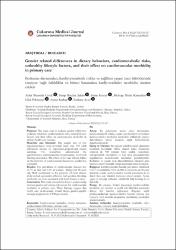Gender related differences in dietary behaviors, cardiometabolic risks, unhealthy lifestyle factors, and their effect on cardiovascular morbidity in primary care

Göster/
Erişim
info:eu-repo/semantics/closedAccessTarih
2022Yazar
Çevik, Ayfer BayındırŞahin, Serap Baydur
Koçan, Sema
Karaaslan, Mehtap Metin
Pekmezci, Hilal
Kırbaş, Aynur
Ayaz, Teslime
Üst veri
Tüm öğe kaydını gösterKünye
Cevik, A.B., Sahin, S.B., Kocan, S., Karaslan, M.M., Pekmezci, H., Kirbas, A. & Ayaz, T. (2022). Gender related differences in dietary behaviors, cardiometabolic risks, unhealthy lifestyle factors, and their effect on cardiovascular morbidity in primary care. Cukurova Medical Journal, 47(2), 535 - 547. http://doi.org/10.17826/cumj.982227Özet
Purpose: This study aims to evaluate gender differences in dietary behaviors, cardiometabolic risks, related lifestyle factors, and their effect on cardiovascular morbidity in primary health care services.
Materials and Methods: The sample size of this population-based cross-sectional study was 930 adult individuals chosen by population-proportional cluster sampling. The researchers administered the questionnaires, anthropometric measurements, and blood drawing procedures. The effect of diet and lifestyle habits on the presence of cardiovascular diseases by gender was examined.
Results: The prevalence of cardiovascular diseases was 11.7% in men and 9.0% in women. Being over 50 years old, MetS contributed to the presence of heart disease while tea had a protective effect on both genders. Smoking and butter use were associated with heart disease in men.
Conclusion: This study showed that there is a relationship between gender and various risk factors for cardiovascular morbidity in primary care. These findings suggest that health care professionals should design gender-specific strategic programs for CVD prevention.

















